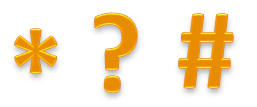Frequently asked questions 2 – Truncation
Questions about truncating search terms when searching databases:
- Why is it necessary to truncate search terms?
- How should I truncate my term?
- What truncation mark should be used?
You do not always have to truncate your search terms but…
- robots (search engines) only search for character strings, not for meanings
- most terms have singular and plural forms, and also genetives
Examples:
- truncated patient* retrieves all these: patient, patients, patient’s
- not truncated patient retrieves only patient
- truncated child* retrieves child, children, child’s children’s
- not truncated child retrieves only child
Different databases use different truncation marks. The most common are asterisk * and question mark ?. Check the database’s manual/FAQ if * does not seem to work. In PubMed, Cochrane Library and Scopus truncate using *. In Josku truncate using ?.

There are also irregular plurals so that the singular and plural forms are different in a way that truncation does not work.
For example:
- foot/feet
- mouse/mice
- tooth/teeth
- woman/women
In some databases it is possible to use so called wild cards and search for e.g. wom*n, but in many databases you have to search singular and plural combined with OR.
For example:
- foot OR feet
- mouse OR mice
- tooth OR teeth
- woman OR women
There are also irregular plurals that can be search by truncating.
For example:
- criteri* retrieves singular criterion and pluralcriteria
- nucle* retrieves singular nucleus and plural nuclei (and also nuclear, nucleic, nucleoid, nucleon…)
- analys* retrieves singular analysis and plural analyses (and also analysand and analyst)
- phenomen* retrieves singular phenomenon and plural phenomena (and also e.g. phenomenology)
Watch a video in YouTube about truncation.
By: Tuulevi Ovaska, Head of Services, Kuopio University Hospital Medical Library, University of Eastern Finland Library